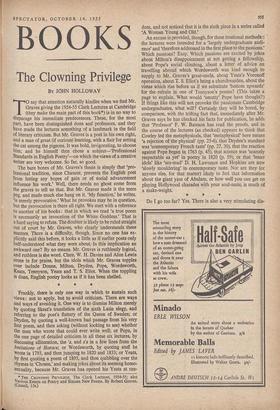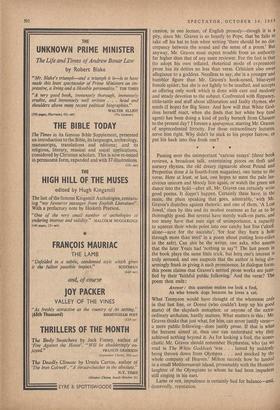BOOKS
The Clowning Privilege
BY JOHN HOLLOWAY TO say that attention naturally kindles when we find Mr. Graves giving the 1954-55 Clark Lectures at Cambridge (they make the main part of this book*) is in no way to disparage his immediate predecessors. These, for the most part, have been distinguished dons and professors, and they have made the lectures something of a landmark in the field of literary criticism. But Mr. Graves is a poet in his own right, and a man of great (if curious) learning, with a flair for setting the cat among the pigeons. It was bold, invigorating, to choose him; and he himself then chose a subject—`Professional Standards in English Poetry'—on which the views of a creative writer are very welcome. So far, so good.
The bare bones of Mr. Graves's thesis is simply that 'pro- fessional tradition, since Chaucer, prevents the English poet from letting any hopes of gain or of social advancement influence his work.' Well, there needs no ghost come from the graves to tell us that. But Mr. Graves made it the mere Peg, and made much else hang on it. 'My function,' he writes, 'is merely provocative.' What he provokes may be in question, but the provocation is there all right. We start with a reference to another of his books : that in which we read 'a true poem is necessarily an invocation of the White Goddess.' That is a hard saying to refute. The doubter is likely to be ruled straight out of court by Mr. Graves, who clearly understands these matters. There is a difficulty, though. Since no one has ex- plicitly said this before, it looks a little as if earlier poets only half-understood what they were about. Is this implication an awkward one? By no means. Mr. Graves is ruthlessly logical, and ruthless is the word. Clare, W. H. Davies and Alun Lewis come in for praise, but the idols which Mr. Graves topples over include Donne, Milton, Dryden, Pope, Wordsworth, Keats, Tennyson, Yeats and T. S. Eliot. When the toppling is done, English poetry looks as if it has been shelled.
• • • Frankly, there is only one way in which to sustain such views : not to apply, but to avoid criticism. There are ways and ways of avoiding it. One way is to dismiss Milton merely by quoting Skeat's translation of the sixth Latin elegy, and referring to the poet's flattery of the Queen of Sweden; or Dryden, by quoting a well-known bad passage from his very first poem, and then asking (without looking to see) whether the man who wrote that could ever write well; or Pope, in the one page of detailed criticism in all these six lectures, by discussing alliteration, the 's, and s's in a few lines from the Imitations of Horace; or Wordsworth, by quoting stuff he wrote in 1793, and then jumping to 1820 and 1833; or Yeats, by first quoting a poem of 1893, and then quibbling over the rhymes in 'Chosen,' and making jokes about its seeming homo- sexuality, because Mr. Graves has opened his Yeats at ran- _ THE CROWNING PRIVILEGE. The Clark Lectures, 1954-55; also Various Essays on Poetry and Sixteen New Poems. By Robert Graves. (Cassell, 15s.) dom, and not noticed that it is the sixth piece in a series called 'A Woman Young and Old.'
An excuse is provided, though, for these irrational methods :1 the lectures were intended for a 'largely undergraduate audi- ence' and 'therefore addressed in the first place to the passions.' Which passions? Easy. Which passions are excited by jokes about Milton's disappointment at not getting a fellowship, about Pope's social climbing, about a letter of advice on travelling abroad which Wordsworth was kind enough to supply to Mr. Graves's great-uncle, abouj Yeats's Voronoff operation, about T. S. Eliot's being a churchwarden, about the vistas which rise before us if we substitute 'bottom upwards' for the refrain in one of Tennyson's poems? (This takes a page to explain. What would 'smutty' Pope have thought?) If things like this will not provoke the passionate Cambridge undergraduates, what will? Certainly they will be bored, by comparison, with the trifling fact that, immediately after Mr. Graves says he has checked his facts for publication, he adds that 'Professor' F. W. Bateson has read the proofs, and in the course of the lectures (as checked) appears to think that Cowley led the metaphysicals, that 'metaphysical' here means `a rejection of the physical' (pp. 25-6), that Dryden's standard was 'contemporary French taste' (pp. 27, 30), that the reaction against Pope began in 1763 (p. 45), that science was 'scarcely respectable as yet' in poetry in 1820 (p. 59), or that 'lesser idols' like `sex-mad' D. H. Lawrence and Hopkins are now `slowly mouldering' in contemporary taste. Nor are they (or anyone else, for that matter) likely to feel that information about the giant yam of Abulam, or how well you can get on playing Hollywood charades with your soul-mate, is much of a make-weight.
Do I go too far? Yes. There is also a very stimulating dis- cussion, in one lecture, of English prosody—though it is a pity, since Mr. Graves is so beastly to Pope, that he fails to take off his hat to him when writing 'there should be no dis- crepancy between the sound and the sense of a poem.' But anyway, Mr. Graves must expect trouble from an authority far higher than that of any mere reviewer. For the fact is that (to adopt his own inflated, rhetorical mode of expression) prose has its deities no less than verse. Criticism also owes allegiance to a goddess. Needless to say, she is a younger and humbler figure than Mr. Graves's hook-nosed, blue-eyed female spider; but she is not lightly to be insulted, and accepts as offering only work which is done with care and modesty and steady devotion to the subject. Confronted with flippancy, tittle-tattle and stuff about alliteration and faulty rhymes, she sends (I hope) for Big Sister. And how will that White God- dess herself react, when she finds that her white boy (and agent) has been doing a kind of perky berserk from Chaucer to the present day? I foresee a sparagmos, starring Mr. Graves, of unprecedented ferocity. For these extraordinary lectures, serve him right. Why didn't he stick to his proper furrow, or put his back into this fresh one?
*
Passing over the unimportant 'various essays' (three book reviews, a broadcast talk, entertaining pieces on theft and nursery rhymes, the old dreary rigmarole about Pound and Propertius done a la fourth-form magazine), one turns to the verse. Here at least, at last, one hopes to meet the pale las- civious unicorn and bloody lion again, or watch the green sea dance into the hold—after all, Mr. Graves can certainly write good poems. It doesn't happen. Certainly these have, in the main, the plain speaking that goes, admirably, with Mr. Graves's diatribes against rhetoric; and one of them, 'A Lost Jewel,' rises by this and its modest neatness as far as to be thoroughly good. But several have merely walk-on parts, and too many have that sure sign of unimportance, a capacity to squeeze their whole point into one catchy last line (`aloof. alone—save for the succuba'; 'for fear they burn a hole through more than steel' in a poem about putting love-relics in the safe). Can this be the writer, one asks, who asserts that the later Yeats had 'nothing to say'? The last poem in the book plays the same little trick, but here one's interest iS truly aroused, and one suspects that the author is being dis- armingly frank in giving it such prominence. In dialogue form, this poem claims that Graves's serried prose works are justi- fied by their 'faithful public following.' And the verse? The poem then ends : Answer: this question makes me look a fool, As who breeds dogs because he loves a cat.
What Tennyson would have thought of the whoreson zeds in that last line, or Donne (who couldn't keep up his good starts) of the slapdash metaphor, or anyone of the extra- ordinary archaism, hardly matters. What matters is this : Mr. Graves thinks that just what, for him, can never justify verse— a mere public following—does justify prose. if that is what the lectures aimed at, then one can understand why they achieved nothing beyond it. As for looking a fool, the icono- clastic Mr. Graves should remember Hephaestus, who (as we read in The White Goddess) 'was . . . lamed by suddenly being thrown down from Olympus . . . and mocked by the whole company of Heaven.' Milton records how he landed in a small Mediterranean island, presumably with the Homeric laughter of the Olympians to whom he had been impudent still ringing in his ears.
Lame or not, impudence is certainly bad for balance—and, deservedly, reputation.











































 Previous page
Previous page